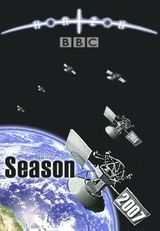
Horizon 44
2007-03-13 | Documentary | 9 episodes60 Seasons
Episode
My Pet Dinosaur (2007)
What if dinosaurs were still alive today? Would we hunt them, farm them - or even keep them as pets? It's a palaeontologist's dream: the chance to live in a world where dinosaurs are not something to be dug out of the ground but are living among us. It may sound far-fetched but dinosaurs were actually rather unlucky. The meteorite impact that doomed them to extinction was an event with a probability of millions to one. What if the meteorite had missed? Had dinosaurs survived, the world today would be very different. If humans managed to survive alongside them, we wouldn't have the company of most, if not all, of the mammals with which we are familiar today. Giraffes, elephants and other mammals wouldn't have had space to evolve. Would we be hunting Hadrosaurs instead of elk? Or farming Protoceratops instead of pigs? Would dinosaurs be kept as pets? And could the brighter dinosaurs have evolved into something humanoid?

The Elephant's Guide to Sex (2007)
How do you save an endangered species? Get the animals in the mood for love. Thomas Hildebrandt possesses one of the world's most extraordinary jobs - getting the planet's endangered animals in the mood for love. The planet's creatures are facing the biggest mass extinction since the dinosaurs were wiped out. Species are currently disappearing at up to 10,000 times the natural rate. Coming to the rescue are men like Dr Hildebrandt and his team. They are world leaders in the art of animal manipulation. The billions of pounds spent benefiting human reproduction are now being applied to save endangered species. Techniques such as artificial insemination and IVF have been crucial to the successes in breeding giant pandas, big cats and other mammals in zoos across the world. As Thomas Hildebrandt says "Man has created this annihilation of species. It's up to man to use his ingenuity to save them."

Prof Regan's Beauty Parlour (2007)
Professor Lesley Regan is on a mission to fill her bathroom cabinet with cosmetics that actually work. Professor Lesley Regan, one of the UK's most well-respected (and glamorous) medical experts, turns her scientific eye on the world of cosmetics. She's just turned 50, and is out to create an experimentally proven beauty cabinet. Unafraid to examine the wrinkles, age spots and broken veins on her own face, Professor Regan explores just what makes us look old, and if we can slow down the ageing process. The extraordinary world of cosmetic testing is revealed, from the British hair lab which makes New York tap water, to the volunteers sun-bathing for science. Sun damage, cellulite and balding all face Professor Regan's scrutiny as she discovers which cosmetics do - and don't - have the scientific evidence to back up their claims.

Mad but Glad (2007)
Pianist Nick van Bloss has Tourette's syndrome. Is his illness a blessing or a curse? Is there really such a thing as the mad genius? Can an illness be both a blessing and a curse? At seven years old, Nick van Bloss started shaking his head, grinding his teeth and making wild whooping noises. Nick had Tourette's syndrome. No medical intervention helped him. But one activity stopped it all... The moment Nick placed his hands on the piano keys his symptoms vanished. By the age of 20, he was an award winning international pianist. He felt sure that his illness had made him the success he was. But there is a catch. The brain state necessary for his genius can also be dangerously close to mental chaos. Nick's personal journey reveals how close he came to the edge and how determined he is to triumph.

Moon for Sale (2007)
After 40 years, man is preparing to return to the Moon. But this time the astronauts won't just land on the Moon - they plan to stay. From his office in Nevada, Dennis Hope has spawned a multi-million dollar business selling lunar real estate. But scientists believe the real prize is trapped in the Moon's rocks. It contains large deposits of an extremely rare gas called Helium-3. Could Helium-3 be mined and used as a new source of almost inexhaustible, clean and pollution-free energy on Earth? Whoever succeeds in transporting Helium-3 back to Earth could solve the world's energy crisis. Who will win what has been dubbed the second Moon race? And should we be exploiting the Moon's valuable resources at all?

Photo


